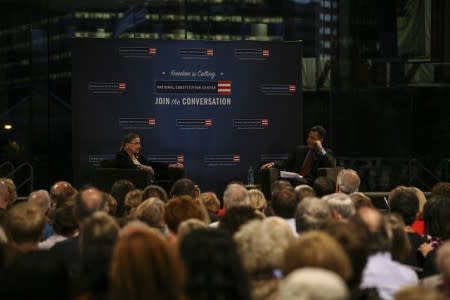A day to celebrate the Constitution
During a visit to the National Constitution Center on Sept. 6, Justice Ruth Bader Ginsburg reiterated how important it is that students across America learn about the Constitution.
“This fundamental instrument of government is something that children should know about,” she said. “There’s the old joke about somebody who goes to a French bookstore and asks for a copy of the French Constitution, and the bookseller says, ‘Sorry, we don’t deal in periodical literature.’ ”
Link: Watch video of Jutsice Ginsburg’s interview at the National Constitution Center
By contrast to the “aspirational” constitutions of France and China, Ginsburg said, the U.S. Constitution from 1787 is still governing us as our “highest law, and it trumps every other law.”
Ginsburg then paid a generous tribute to the unique role of the Constitution Center as a headquarters for educating students of all ages about the Constitution. “This is a marvelous facility,” she said. “That there is this place that is spreading knowledge about this most remarkable instrument of government that we have, it is a treasure.”
The center has a mission from Congress “to disseminate information about the United States Constitution on a nonpartisan basis,” and we are dedicated to hosting constitutional debates and education every day of the year. But a highlight of our yearlong celebration of active citizenship will take place on Tuesday, Constitution Day, which marks the 226th anniversary of the signing of the Constitution across from the Constitution Center in Independence Hall.
In keeping with our nonpartisan mission, we are hosting panels and debates on a range of topics – from the meaning of free speech to the legacy of the civil rights movement. But as I look forward to a day rich in constitutional conversations, I’m struck by how many of them involve debates about the scope and meaning of the right to privacy, from the constitutionality of drones to the scope of the Supreme Court’s recent decision recognizing a fundamental right of marriage equality.
As in any constitutional conversation, there are strong arguments on both sides of all these debates. Does the Fourth Amendment permit targeted assassinations of American citizens abroad? The Obama administration argues yes, citing Supreme Court decisions that permit the use of deadly force to respond to “imminent threats.” Critics are unconvinced, noting that terrorist suspects abroad who are not engaged in violence and have not been convicted of any crime pose nothing like the imminent threat of a fleeing felon threatening an officer with deadly force.
Along similar lines, does the Fourth Amendment permit the government to use cameras mounted on drones to follow suspected criminals 24 hours a day for a month? In a related case, the Obama administration recently argued yes, claiming that police officers could put a GPS device on the bottom of a suspect’s car and track his movements round the clock for a month. The Supreme Court unanimously rejected the administration’s claim that citizens have no expectations of privacy in public. But the court’s reasoning doesn’t clearly settle the constitutionality of drone surveillance.
And then there is the question of marriage equality. When the court struck down the Defense of Marriage Act in June, Justice Anthony M. Kennedy, writing for a 5-4 majority, stressed that he was not calling into question the many state laws, like the one in Pennsylvania, that ban same-sex marriage.
Justice Antonin Scalia, in his dissent, predicted the opinion would indeed be invoked to challenge state bans on same-sex marriage, despite Kennedy’s claims to the contrary. And in July at the Constitution Center, Pennsylvania Attorney General Kathleen Kane seemed to vindicate Scalia’s prediction when she refused to defend the state’s same-sex marriage ban.
Drones and marriage equality are just two topics to be debated Tuesday at the Constitution Center. We plan a full day of constitutional conversations and interactive activities. Visitors can hear the best arguments on all sides and then make up their own minds.
These conversations are part of our motto: Visit. Learn. Debate. Like Justice Ginsburg, we believe participating in conversations that shape the meaning of the Constitution is one of the privileges of citizenship. We hope you will join us.
Jeffrey Rosen is the president and CEO of the National Constitution Center. Admission to the Constitution Center is free on Tuesday. More information at constitutioncenter.org.
Hall Pass
Watch our annual Hall Pass video for students at the following link: http://constitutioncenter.org/constitution-day/
Constitution Day Resources
10 fun facts about the Constitution and Constitution Day
Can you pass a Bill of Rights quiz?
Pop quiz: 10 basic Constitution questions!
20 questions kids ask the most on Constitution Day



